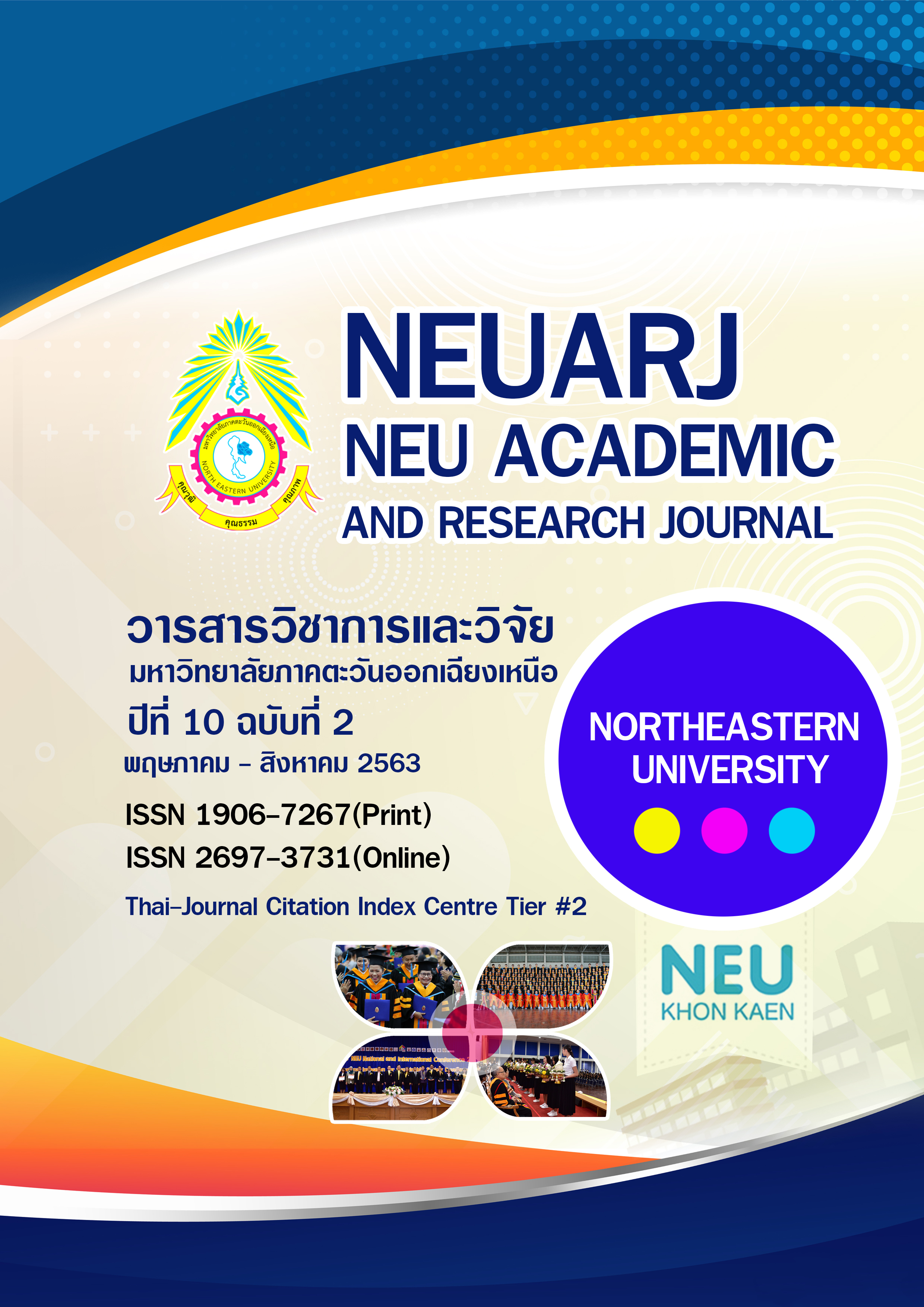Academic Leadership and Buddhism Method for Educational Management
Keywords:
Academic Leadership, Buddhism ModelAbstract
Academic Leadership of school administrators directly plays an important role in learning and teaching management. It is a condition of factors to enhance the school performance as expected to the success (Larson, 2006), which is directly related to student’s learning and academic achievement (Hopkins, 2001). Also, it is found that the components of the academic leadership of the school administrators have relationship and become an indicator of the school effectiveness (Buzzi, 1991). It is necessary to apply the Buddhism doctrine related to the ethical characteristics of leadership on self, human and job development, especially the relationship between leadership and followership with Buddhist principles for organizational change. This shows that, to change the organization, there needs to be connection between education and social environment. Moreover, there needs to be able to analyze problems and trends of education in Thailand obviously, as well as, being leadership on education reform, academic matter, and administration. In addition, there has to be a specialist in a certain area, be knowledgeable of administration principles, techniques and, strategic planning, including being able to apply the principles to enable the educational administration to achieve its goal with the highest efficiency and effectiveness. Along with the school administrators needs the ability to use their own knowledge and arts, nationalist, human relations, and technical skills, also, the ability to manage human resources, budget, materials, places and buildings. Besides that, the school administrators need to be able to mobilize educational resources both in the schools and communities in order to develop the administration in various fields within the educational institutions for excellent achievement.
References
ชฎากาญจน์ เจริญชนม์. (2553). ภาวะผู้นำทางวิชาการที่ส่งผลต่อประสิทธิผลของโรงเรียน สังกัดสำนักงานเขตพื้นที่การศึกษาขอนแก่น เขต 1. (รายงานการศึกษาอิสระปริญญาศึกษาศาสตรมหาบัณฑิต, หาวิทยาลัยขอนแก่น).
ดำรง สุ่มสังข์. (2551). การพัฒนาจริยธรรมตามหลักไตรสิกขา: ศึกษาเฉพาะกรณีค่ายสรรพสิทธิ์ประสงค์ จังหวัดอุบลราชธานี. (สารนิพนธ์ปริญญาครุศาสตรมหาบัณฑิต, มหาวิทยาลัยมหามกุฏราชวิทยาลัย).
ปัญญา นันทภิกขุ. (2561). ชีวิต การทำงาน หลักธรรม. กรุงเทพฯ: สำนักหอสมุด มหาวิทยาลัยเกษตรศาสตร์.
พระธรรมปิฎก. (ป.อ. ปยุตโต). (2539). การพัฒนาที่ยั่งยืน (Sustainable Development). กรุงเทพฯ: สำนักพิมพ์มูลนิธิพุทธธรรม.
พระธรรมปิฎก. (ป.อ. ปยุตโต). (2542). ธรรมกับไทย ในสถานการณ์ปัจจุบัน. กรุงเทพฯ: สำนักพิมพ์มูลนิธิพุทธธรรม.
พระพรหมคุณาภรณ์. (ป.อ. ปยุตฺโต). (2546). ภาวะผู้นำ: ความสำคัญต่อการพัฒนาคน พัฒนาประเทศ. กรุงเทพฯ: ธรรมสภา.
พระมนัส ธมฺมรโต (มณี). (2554). ศึกษาวิธีสร้างแรงจูงใจจากพุทธวิธีการสอน. (วิทยานิพนธ์พุทธศาสตรมหาบัณฑิต, มหาวิทยาลัยมหาจุฬาลงกรณราชวิทยาลัย).
พิมลพรรณ เพชรสมบัติ. (2555). การพัฒนารูปแบบภาวะผู้นำของผู้บริหารศูนย์การศึกษานอกระบบและการศึกษาตามอัธยาศัยอำเภอ สังกัดสำนักงานส่งเสริมการศึกษานอกระบบและการศึกษาตามอัธยาศัย. (ดุษฎีนิพนธ์ปริญญาดุษฎีบัณฑิต, มหาวิทยาลัยเซนต์จอห์น).
พุทธทาส ภิกขุ. (2512). จริยธรรมของบัณฑิต. กรุงเทพฯ: ธรรมสภา
พุทธทาส ภิกขุ. (2535). ชุมนุมปาฐากถา ชุด พุทธธรรม. กรุงเทพฯ: สุขภาพใจ
ไพฑูรย์ เริงกมล. (2541). การสร้างแรงจูงใจในการปฏิบัติงานที่ผู้บริหารควรตระหนัก. กรุงเทพฯ: พัฒนาการศึกษา.
ไพเราะ พัตตาสิงห์. (2554). การศึกษาความสัมพันธ์ระหว่างภาวะผู้นำทางวิชาการกับการส่งเสริมการวิจัยในชั้นเรียนของผู้บริหารสถานศึกษา สังกัดสำนักงานเขตพื้นที่การศึกษาประถมศึกษาอ่างทอง. (วิทยานิพนธ์ปริญญาครุศาสตรมหาบัณฑิต, มหาวิทยาลัยราชภัฏพระนครศรีอยุธยา).
ภารดี อนันต์นาวี. (2551). หลักการ แนวคิด ทฤษฎีทางการบริหารการศึกษา.(พิมพ์ครั้งที่ 2). ชลบุรี: สำนักพิมพ์มนตรี.
สมคิด กลับดี. (2549). แรงจูงใจในการปฏิบัติงานของผู้บริหารสถานศึกษาขั้นพื้นฐาน เขตพื้นที่การศึกษาชลบุรี เขต 2. (วิทยานิพนธ์ปริญญาครุศาสตรมหาบัณฑิต, มหาวิทยาลัยราชภัฏราชนครินทร์).
เอื้อนจิต พานทองวิริยะกุล และ สัญญา เคณาภูมิ. (2561). ภาวะผู้นํากับการพัฒนาสุขภาวะของประชาชนให้ยั่งยืน.วารสารวิชาการและวิจัยมหาวิทยาลัยภาคตะวันออกเฉียงเหนือ, 8(1), 107-114.
Buzzi, M. (1991).The relationship of school effectiveness to selected dimension of principle’s instructional leadership in elementary school in the State of Connecticut.Dissertation Abstracts International, 51(12), 3167-A.
Davis, K. & Newstrom, J.W. (1989).Human behavior at work organizational behavior. New York: McGraw-Hill Book.
Girvan, N. (2001). Reinterpreting the Caribbean. In B. Meeks & F. Lindahl (Eds.). New Caribbean thought: A reader. Jamaica: University of the West Indies Press.
Hopkins, D. (2001). School Improvement for Real. London: RoutiedgeFalmer.
Larson, J. L. (2006). Subjective fatigue, influencing variable, and consequences in chronic obstructive pulmonary disease.Nursing Research, 55(1), 10-17.
McEwan, E. K. (2003). Seven steps to effective instructional leadership. California: Corwin Press.



